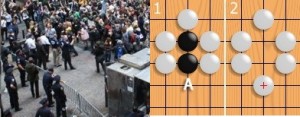Some believe that the cream rises to the top, that destiny shines favor on those worthy, and that the others must serve by falling into line — if we’re ever to reach a greater good.
Every enhancement of the type ‘man’ has so far been the work of an aristocratic society—and it will be so again and again—a society that believes in the long order of rank and differences in value between man and man, and that needs slavery in some sense or other. – Nietzsche
This is a different sort of collectivism, not individualism as a Wall Street tycoon might profess it — although they may prefer more pleasant words, invoking lions and lambs.
Are all ‘men’ created equal? Some are stronger, smarter, and more creative — while others put themselves in charge. The caste serve and subordinate their interests for the greater good of the economy, collectively, so the worthy may be rewarded.
What luck for rulers that men do not think. – Adolf Hitler
How else can one man spend more on a meal than 400 men make all day working? And this isn’t even an extreme example, but it illustrates the inequality of each along this ranking, and that some unarguably benefit more from the current arrangement.
My philosophy aims at ordering of rank not at an individualistic morality. – Nietzsche
A fool would confuse our current hierarchy with either individualism or capitalism — as they do when they prescribe inflexibly old ideas to new problems without adaptation. The world is too big and complex to control through management, caste, and requires true democratic equality.
A concept people on all sides’ fear, when on a day to day basis it is the only truth we seem to trust. Don’t trust me, trust yourself, and then trust those who will come to your aid. Mutual aid is the fundamental basis of all civilization, and the true wellspring of every true enhancement. The story of every invention, discovery, or great work of art began with an individual in a small band of individuals engaged in mutual aid, an essentially leaderless endeavor.
Some will strongly disagree, point to the great figures of history, those who through sheer force of will changed the world for the better. Individuals are paramount, they decide, but none of these people were truly alone.
Feral children aren’t high achievers, despite what Rand may romantically contend. And this romanticism, or celebrity, is a great disservice to those who follow, as it is not a formula for success. It is instead a formula for parasitism, rather than the more time honored human strategy of mutualism.
Democracy is the highest form of government, because it acknowledges this truism, that each is born into this world with freewill, and that it cannot be legislated without consent. We must be free to succeed, and our success will only come through mutual aid, reciprocity. One can facilitate, one cannot lead – the terms are not synonymous where people are concerned. Therefore, while the environment of the General Assembly is ideal for democratic decision making locally, any higher national or international organizational communication must be carefully considered, to avoid recreating the inequality, hierarchy which ranks our priority of speech in our own society. It must be akin to the consensus of a General Assembly.
I believe success, not just lip service success, will only be achieved through a global brain approach. Democratically harnessing the power of the noosphere, and developing into a true Noocracy.
Postscript: If this has seemed wordy, or nerdy — I was just aiming for precise. Many people speak broadly to skirt their intent. Calling people Socialists or Communists or Collectivists or Capitalists without understanding what each means can be akin to McCarthyism or Beck’s latter-day John Birch Society (which apparently both has grown today, and supports ending the Federal Reserve — I hope they aren’t tied to this — beyond their various efforts at unity–through–scapegoating). Ideas aren’t teams — they’re tools. Sometimes they fit, and other times they’re wrong. Society must be a conversation.
IRC maybe fine, while facebook page or website administration, like newspaper editing or mainstream media producing leaves a lot to be desired — generating a lot of fiefdoms. This is not an attack on the admins, who are doing the best they can with clunky technology. Mutual aid may find a way.
While this all may work despite such limits, there needs to be a better integration of on-the-ground General Assemblies and virtual ones, as in many places the internet is a luxury. I like technology, but there is something to be said about small, something akin to viral order.
While it may sound fancy, all this is reminding me of how a number of Ben Franklin’s Junto societies might have mutually improved – and this alone constitutes success in a world such as ours.














